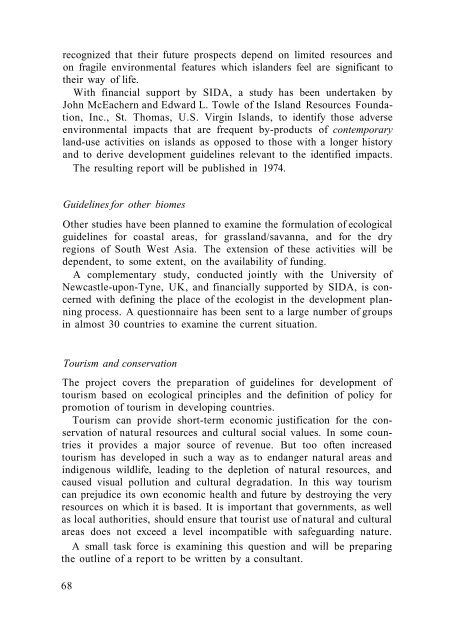1973 iucn yearbook
1973 iucn yearbook
1973 iucn yearbook
Create successful ePaper yourself
Turn your PDF publications into a flip-book with our unique Google optimized e-Paper software.
ecognized that their future prospects depend on limited resources and<br />
on fragile environmental features which islanders feel are significant to<br />
their way of life.<br />
With financial support by SIDA, a study has been undertaken by<br />
John McEachern and Edward L. Towle of the Island Resources Foundation,<br />
Inc., St. Thomas, U.S. Virgin Islands, to identify those adverse<br />
environmental impacts that are frequent by-products of contemporary<br />
land-use activities on islands as opposed to those with a longer history<br />
and to derive development guidelines relevant to the identified impacts.<br />
The resulting report will be published in 1974.<br />
Guidelines for other biomes<br />
Other studies have been planned to examine the formulation of ecological<br />
guidelines for coastal areas, for grassland/savanna, and for the dry<br />
regions of South West Asia. The extension of these activities will be<br />
dependent, to some extent, on the availability of funding.<br />
A complementary study, conducted jointly with the University of<br />
Newcastle-upon-Tyne, UK, and financially supported by SIDA, is concerned<br />
with defining the place of the ecologist in the development planning<br />
process. A questionnaire has been sent to a large number of groups<br />
in almost 30 countries to examine the current situation.<br />
Tourism and conservation<br />
The project covers the preparation of guidelines for development of<br />
tourism based on ecological principles and the definition of policy for<br />
promotion of tourism in developing countries.<br />
Tourism can provide short-term economic justification for the conservation<br />
of natural resources and cultural social values. In some countries<br />
it provides a major source of revenue. But too often increased<br />
tourism has developed in such a way as to endanger natural areas and<br />
indigenous wildlife, leading to the depletion of natural resources, and<br />
caused visual pollution and cultural degradation. In this way tourism<br />
can prejudice its own economic health and future by destroying the very<br />
resources on which it is based. It is important that governments, as well<br />
as local authorities, should ensure that tourist use of natural and cultural<br />
areas does not exceed a level incompatible with safeguarding nature.<br />
A small task force is examining this question and will be preparing<br />
the outline of a report to be written by a consultant.<br />
68

















